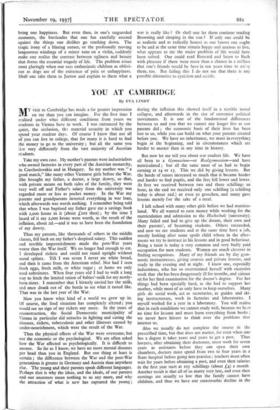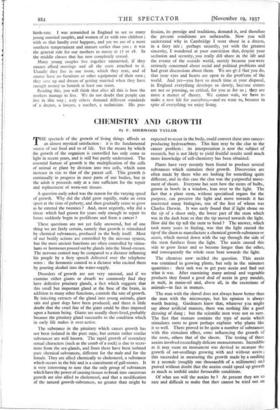YOU AT CAMBRIDGE
By EVA LINDT
MY visit to Cambridge has made a far greater impression . on me than you can imagine. For the first time I realised under what different conditions from yours we students in Vienna have to work. I was entranced by the quiet, the seclusion, th: material security in which you spend your student days. Of course I know that not all of you can live in college, that for many it is hard to find the money to go to the university ; but all the same you live very differently from the vast majority of Austrian students.
Take my own case. My mother's parents were industrialists who owned factories in every part of the Austrian monarchy, in Czechoslovakia and in Hungary. So my mother was " a good match," like many other Viennese girls before the War. She brought my father, a doctor, a large dowry, so that, with private means on both sides of the family, they were very well off and Father's salary from the university was regarded more or less as pocket money. In the War my parents and grandparents invested everything in war loan, which afterwards was worth nothing. I remember being told that when I was baptised my father gave me a savings book with 2,000 krone in it (about £roo then) ; by the time I heard of it my 2,000 krone were worth, as the result of the inflation, about 2d.—and it was to have been the foundation of my dowry.
Thus my parents, like thousands of others in the middle classes, fell back on my father's despised salary. This sudden and terrible impoverishment made the post-War years worse than the War itself. We no longer had enough to eat. I developed rickets and could not stand upright without metal splints.. Till I was seven I never ate white bread, and then it came from the American relief. Nor had I seen fresh eggs, fresh milk, or white sugar ; at home we only used substitutes. When four years old I had to walk a long way to fetch the limited ration of babies'-milk for my newly- born sister. I remember that I bitterly envied her the milk, and once drank out of the bottle to see what it tasted like. That was in the last year of the War.
Now you know what kind of a world we grew up in. Of course, the food situation has completely altered; you would see no sign of my rickets any more. In the years of reconstruction, the Social Democratic municipality of Vienna in particular did miracles in fighting and curing the diseases, rickets, tuberculosis and other illnesses caused by under-nourishment, which were the result of the War.
Thus the physical effects of the War were overcome, but not the economic or the psychological. We are often asked how the War affected us psychologically. It is difficult to answer. So far as I know, we have no more mental diseases per head than you in England. But one thing at least is certain ; the difference between the War and the post-War generations is greater in Germany and Austria than anywhere else. The young and their parents speak different languages. Perhaps that is why the ideas, and the ideals, of our-parents and our ancestors mean nothing to us any more, and why the attraction of what is new has captured the young ; during the inflation this showed itself in a terrible moral collapse, and afterwards in the rise of extremist political movements. It is one of the fundamental differences between us and you that we cannot any longer live as our parents did ; the economic basis of their lives has been lost to us, while you can build on what your parents created before you. We have no inheritance, we must in everything begin at the 13:ginning, and in circumstances which are harder to master than at any time in history.
But now let me tell you about our student life. We have all been to a Gymnasium—or Realgymnasium—and have matriculated ; but all the same most of us had to begin earning at 14 or 15. This we did by giving lessons. But the horde of tutors increased so much that it became harder and harder to find pupils, and the fees fell lower and lower. At first we received between two and three schillings an honr, in the end we received only one schilling (a schilling today is about rod.) or even 5o groschen, and many gave lessons merely for the sake of a meal.
I left school with many other girls before we had matricu- lated. We all wanted to earn money while working for the matriculation and admission to the Hochschule (university). Many failed and had to give up the dream, their own and their parents', of becoming students. Others succeeded, and now we are students and at the same time have a job, mostly looking after some spoilt child whom in the after- noons we try to instruct in his lessons and in good behaviour. Being a tutor is today a very common and very badly paid occupation for men students. Women are much cleverer in finding occupations. Many of my friends are by day gym- nastic instructresses, giving courses and private lessons, and study in the evening and at night. I know one, especially industrious, who has so overstrained herself with excessive work that she has been dangerously ill for months, and cannot sit for her final examination for the doctor's degree. For her things had been specially hard, as she had to support her mother, while most of us only have to keep ourselves. Many girls do social work, act as secretaries, as guides and ski- ing instructresses, work in factories and laboratories. I myself worked for a year in a laboratory. You will realise that in such conditions we cannot study well, because we have no time for lessons and must learn everything from books ; we never have leisure to think over the problems that interest us.
Also we usually do not complete the course in the prescribed time, but that does not matter, for even when one has a degree it takes years and years to get a post. Thus lawyers, after obtaining their doctorate, must work for seven years as assistants before they can open their own chambers, doctors must spend from two to four years in a State hospital before going into practice ; teachers must often wait for years before obtaining a post, and even then salaries in the first year start at 105 schillings (about £4) a month. Another result is that all of us marry very late, and even then earnings are usually so low that the family cannot have children, and thus we have our catastrophic decline in the birth-rate. I was astonished in England to see so many young married couples, and women of 21 with two children ; with us that hardly ever happens, and yet we are of a more southern temperament and mature earlier than you ; it was the general rule for our mothers to marry at 17 or 18. In the middle classes that has now completely ceased.
Many young couples live together unmarried, if they cannot afford marriage and all the costs attached to it. Usually they live in one room, which they rent, and of course have no furniture or other equipment of their own ; they save up and dream of getting married when they have enough money to furnish at least one room.
Reading this, you will think that after all this is how the workers manage to live. We do not doubt that people can live in this way ; oily others demand different standards of a doctor, a lawyer, a teacher, a technician. His pro- fession, its prestige and traditions, demand it, and therefore the present conditions are unbearable. Now you will understand why in Cambridge I went about in a dream, in a fairy tale ; perhaps unjustly, yet with the greatest sincerity, I wondered at your conviction that, despite your seclusion and security, you really did share in the life and the events of the outside world, merely because you were seriously concerned about social and political problems and had great discussions about them. We are gla l that-you do, that your eyes and hearts are open to the probl,ems of the world. And yet—you have so much time at your disposal, in England everything develops so slowly, because events are not so pressing, so critical, for you as for us ; they are more a matter of theory. We cannot wait, we have to make a new life for ourselves,—and we want to, because in spite of everything we enjoy living.

















































































































 Previous page
Previous page